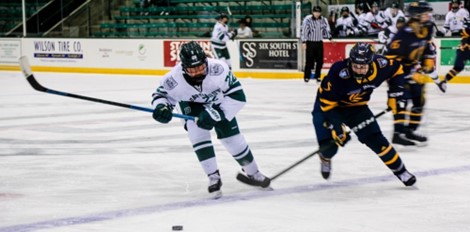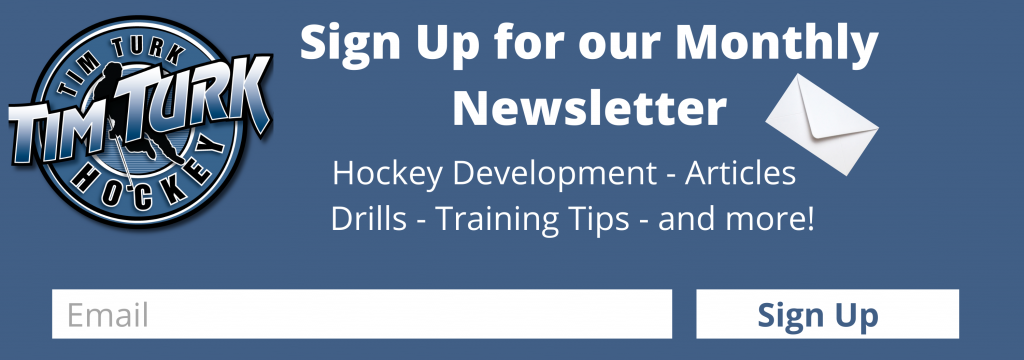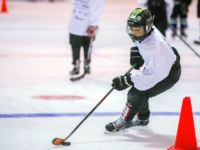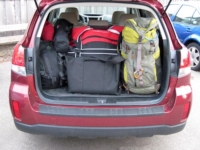There are a ton of distractions during practice and games, so it’s no wonder that it’s difficult for kids to stay focused while they’re on the ice. From friends talking, to parents in the bleachers grabbing your attention, it can be difficult to listen to the coach explain a drill for longer than a few seconds before zoning out.
Whatever the cause, being constantly distracted while on the ice can really affect your performance. Improving at hockey requires more than just showing up to practice and games—you also have to try your best to focus when your coach is talking, when you’re doing a drill, and when you’re playing a game.
Fortunately, lack of focus is a problem that’s easily fixed in most cases. Preventing distraction can be as simple as learning and implementing a few tips and tricks while on the ice, and soon you’ll be dialed in and focusing like a true professional.
Stick to a Routine and Have a Plan
Keeping focused during practice or a game is easier when you do the same things every time you enter the rink. Of course, there’s no way to predict what the coach will ask you to do—just make habits out of the things you can control.
Have a mental checklist ready: head to the changeroom, put on my gear, grab a drink of water. head over to the ice and wait for instructions from the coach. It’s also good to have a similar mental checklist for when you get off the ice, and this can include assessing how well you focused during the practice/game and giving yourself a rating out of 10.
If you make habits out of your preparation process, those things will become subconscious actions and will free up mental space for you to focus on improving your game and playing your best.
It’s also helpful to go into every practice and game with a plan of what you’re going to work on. For example, if your coach told you that you need to keep your feet further apart when you skate, whenever you’re doing a drill or playing a game, think about your skating and make sure you’re keeping your feet far enough apart. Do this with one skill at a time, and you’ll start to see rapid improvement!
Eye Contact
Another good way of keeping focus is with your eyes. Where you look is where your attention is, so do your best to prevent your eyes from wandering during practices and games. If your coach is speaking to you, make eye contact—it’ll make it a lot easier to listen and understand everything they’re saying. If you’re doing a drill, keep your eyes on the key component of that drill (whether it’s cones, the puck, the net, etc.). If you’re playing a game, always keep your eyes on your target; don’t let your vision stray into the stands or anywhere else less important.
Talk to Your Teammates/Parents
Sometimes distraction is caused by chatty friends or excited parents. If your teammates are always trying to talk to you about unrelated things or if you can always hear your mom or dad shouting at you from the stands and you find it distracting (even if they’re cheering for you!), talk to your teammates or parents before you go on the ice and ask them to wait until after the practice or game.
Breathing /Mindfulness Exercises
At some point you’ve probably heard someone tell you to “take some deep breaths” if you’re upset or angry. Well, the theory behind deep breathing doesn’t just apply to moments of rage.
Anytime you want to clear your mind and focus, try some breathing or mindfulness exercises. In the simplest form, just stop what you’re doing, close your eyes, and take five deep breaths, taking a long time to inhale and exhale. You can do these breathing exercises whenever you want—in the car on the way to the rink, in the changeroom before a game, and even on the ice during practice if you get a spare moment. Taking some deep breaths and clearing your head will allow you to regain your focus and approach challenges with a calm, level head.
Eat Before the Practice/Game
Hunger can be one of the worst causes of distraction for athletes, and it’s also one of the easiest to fix. The problem is that eating needs to be carefully balanced with sports. You can’t eat too much too close to a game because you might develop cramps (or worse, vomit), but you also can’t eat too far away from the game because you’ll have no fuel in the tank to perform at the level you need.
If you know you’re going to have a practice or a game on a certain day, it’s best to eat a meal around 2-3 hour before you’re going to step on the ice. Then, around half an hour or fifteen minutes before you’re going to play, have a small, energy-rich snack like a protein bar. This way, you won’t be thinking about your hunger; you’ll only be thinking about how to perform at your best.
Sleep Well Before the Practice/Game
Just as hunger can be a distraction to athletes, tiredness can be a distraction too, and a very bad one at that!
Make sure you’ve slept enough the night before a practice or a game. Poor sleep is a notorious cause for lack of focus. Try to get at least 8 hours before a big performance day. If you’re not able to get that much sleep, try to have a short power nap (15-30 minutes long) a few hours before the game for an extra burst of energy that will help you stay focused.
Train Your Focus Off-Ice
This tip is the hardest on the list but also the most rewarding if you put in the time and effort.
There are many ways that you can train your focus:
-Try to sit in silence and do nothing for 10 minutes
-Complete a short puzzle or some other sort of brain game every day
-If you usually work while watching videos or listening to music, try to work without any other forms of stimulation
-Ask one of your family and friends to talk to you about something complicated and see how much information you can remember
If you do a few of these exercises every so often, you’ll find that your focus will improve, which can be an invaluable skill on the ice and in all other areas of your life!






